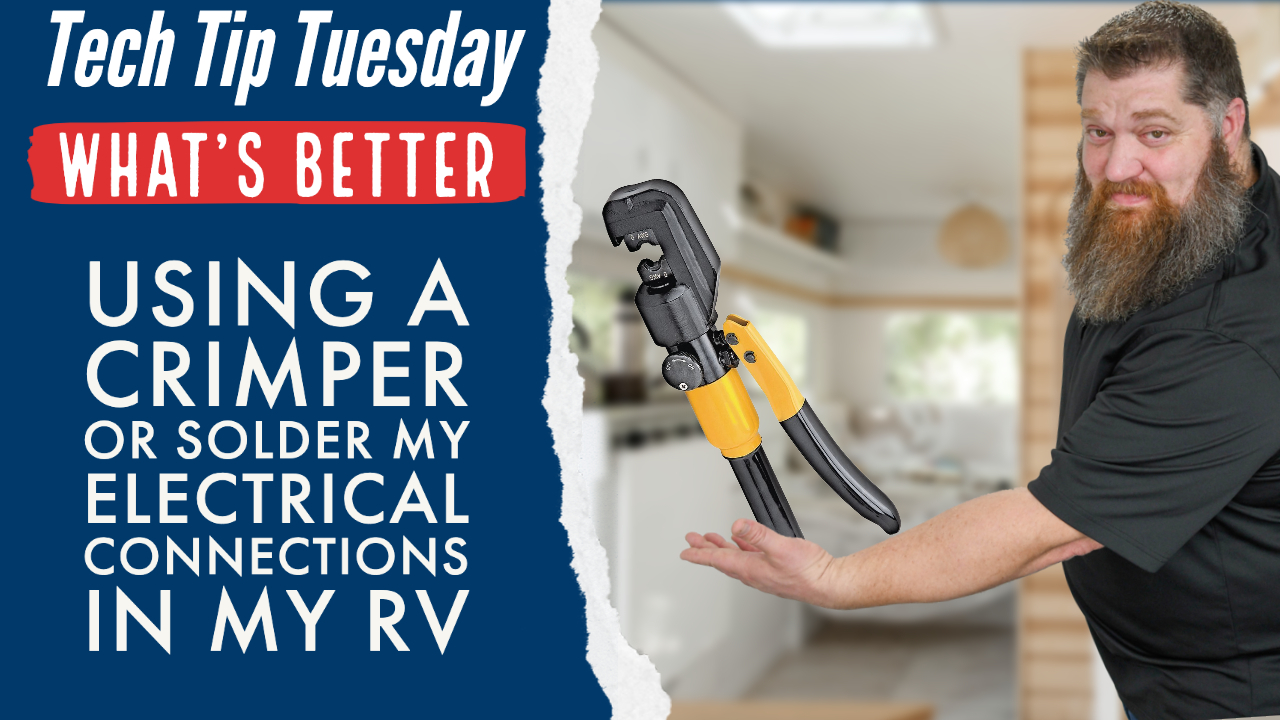Get your RV Technician Certification in as little as 5 weeks!

Welcome to another Todd’s Two Minute Tech Tip Tuesday. Brought to you by the National RV Training Academy. The largest hands-on RV training academy in America.
This week Mike Watkins is going to throw me into that age-old debate that I don’t want to answer. Which one is better? Using electrical crimp connectors, some type of crimp connectors, my electric wiring, or solder them? I do have my preference.
There’s a second question he asked: “In the RV industry are we ever going to follow code?” We do follow a code and that is the NFPA (National Fire Protection Association) and NEC (National Electric Code). We take our guidelines from what’s already out there to establish the NFPA.
Now let’s get into the first question…
Should we solder our connections together or use a crimp connection? I personally prefer a crimp connection. Let’s say we’re putting something together and I’m having to put some type of fitting on the end of the electrical connection, I’m going to use a crimp connection. The quality of the crimper is what’s going to be paramount; I want to take that copper whether it’s tin or regular stranded copper and I want to compress that down and evenly to where it becomes what we call a cold weld. I want to make sure it’s just 100% copper inside that connection and a good quality crimper will do that. Any devices where you just squeeze are not quality crimpers. You need one with dies so you get the proper size with proper gauge wiring and you put your fitting in your wire and you crimp it.
I of course do not like using any type of soldering, but let me tell you about soldering from what I know. Now I do understand that in certain applications soldering is amazing but if you have stranded wire, the solder itself, whether it’s going to be any type of tan or whatever it’s going to wick up those strands and that’s going to create air gaps so I don’t prefer soldering at all when it comes to my connections. Now if it’s going to be on a circuit board or something like that, you could solder it there. If it’s going to be low amperage but I need a good connection you can solder it, but if it’s going to a battery post, busbar, or something that’s exposed then I will definitely, the larger the gauge of the wire as well, refer to using a crimp connection. Very small connections and circuit boards, solder. I know it’s a specific question but the reason why I answered that is because we’re getting in the RV space, we’re getting more and more into solar, and we as RV owners need to understand these connections so I wanted to go ahead and do that. I prefer if it’s going to be high amp or a large gauge cable we’ll use a good solid crimper with dies. If it’s something small that’s going to be on a circuit board and I can get a good clean connection, then we can go with the solder.
Second question again, now when we’re looking over these connections what should we do? Well the closest we have is the marine industry. There’s a few things that are different in the marine industry but it has been forming their guidelines for quite a while now so they’ve done a lot of the work that we can definitely glean off of and kind of follow all of that as well but right now we’re following the NFPA (National Fire Protection Association) and secondarily the NEC (National Electric Code).
And there’s your Tech Tip.
Want to have more control over your time and money? The RV industry is in high demand with 1000’s of Technicians and Inspectors needed and now is the time to act. Click the “Request Info” tab in the top right corner to get started today.
Get Registered Today!
Talk to a student advisor to learn more!